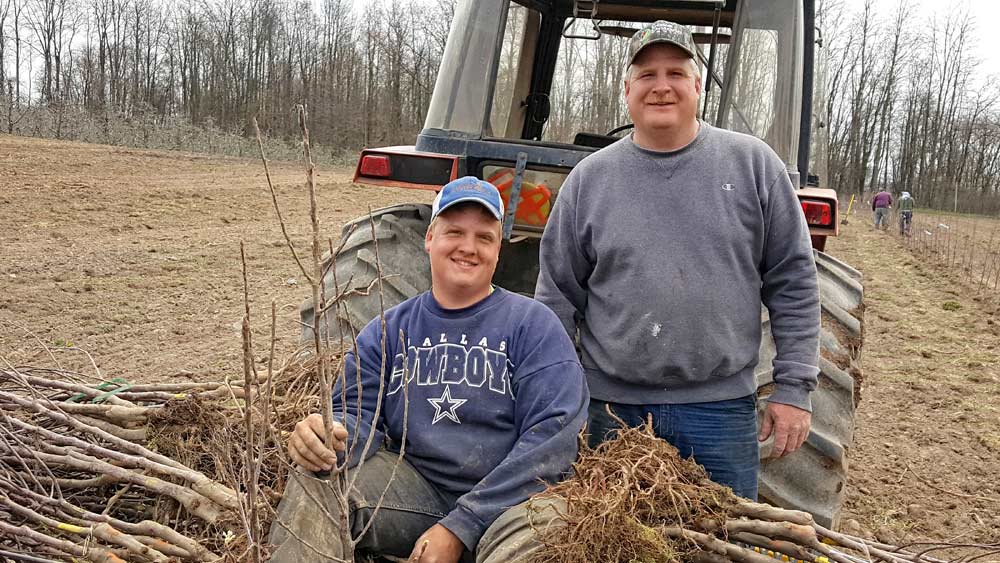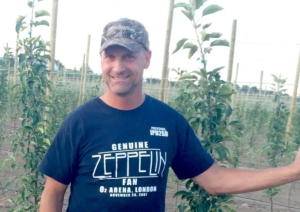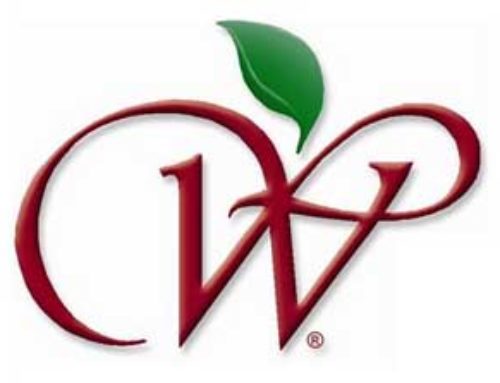
Twin Bee Orchard co-owner Tony Blattner and his son Nathan, left, take a break while planting 4,600 Smitten trees in spring 2016. Twin Bee, in west-central Michigan, has 135 acres of apples, including Gala, Red Delicious, Fuji, Honeycrisp, McIntosh, Empire, Ida Red and Jonagolds. (Courtesy Twin Bee Orchard LLC.)
Every year, apple growers ponder some tough questions: What will the market be like in six or seven years? Is this the right time to change out some of my varieties?
If so, what should I switch to? The answers to those questions are becoming more and more difficult as consumer and retail-market preferences shift and the number of varieties continues to surge.
Good Fruit Grower caught up with two growers — Michael Zingler and Tony Blattner — who shared the stories behind their decisions to add a new variety, in this case the club apple Smitten.
The first trees of this New Zealand variety are just now being sold commercially in the United States through North American licensee Pegasus Premier Fruit Co. of Quincy, Washington.
Zingler is a co-owner along with his son James of Zingler Farms Inc. in western New York. He is one of several growers who jointly own the packing house Lake Ontario Fruit and who are collectively planting 135 acres of Smitten over the next three years. (Zingler will be planting 21 acres of Smitten among his 350 acres of apples.)
Blattner is co-owner of the 135-acre Twin Bee Orchards of west-central Michigan. Twin Bee Orchards planted 5 acres in the spring of 2016 and has similar plans in 2018.
He is also part-owner of the Michigan apple-marketing company BelleHarvest Sales, chair of the Michigan Apple Committee, and a regional director on the U.S. Apple Board.
Why were you considering a new variety?
Blattner: From a grower point of view, I have continued to see a downturn in interest for some of the older, traditional varieties, such as Red Delicious, Goldens, Jonathans and even McIntosh in the Midwest. And with that also comes lower returns to me as a grower.
So there was an interest to try to find something different that I could offer my marketer, that would increase my overall FOB average, and that would also fit into my harvest schedule to replace some of the older, less-profitable process varieties.
Zingler: Our business model has been to get out of some of the older varieties, and seek out new and high-value, managed varieties. We are already growing SweeTango, Kiku and Koru (a New Zealand apple with Fuji and Braeburn parentage), and we have a couple more lined up.
Of course, there’s a certain amount of risk with that. While we’re always optimistic and hopeful, we don’t expect every variety to be successful and we’ve factored that into our plan. We do believe Smitten will be a success.
How did you come across Smitten, and what initially attracted you to it?

Michael Zingler stands among the trees at Zingler Farms Inc. in western New York. He is one of several growers who is planting the new variety Smitten. (Courtesy James Zingler)
Zingler: I happened to be at the New York Fruit and Produce Show in Manhattan a couple of years ago, and as I was walking around looking at the different displays, I came upon the Pegasus booth.
I had read about Smitten before and they had the apple there. I thought that the packaging was really excellent from a marketing standpoint. I thought Smitten was a great name, and it had a great tagline in “Once Bitten, Forever Smitten.”
Blattner: BelleHarvest organizationally was looking for something to add to our current mix of varieties. Retailers are always looking for something different.
I got involved with Smitten when our vice president of marketing and a part-owner both went down to New Zealand a little over a year ago (to check out some of the new options) and ultimately met up with Prevar Ltd.
By then, Smitten was already being propagated and grown in New Zealand, so they were able to see some product on the tree and taste it.
After that meeting with Prevar, BelleHarvest learned that Pegasus had the North America license to propagate and sell it throughout the United States.
After some discussions with Pegasus, some fruit was sent over, we brought in a core group of growers, including myself, to sample it.
How did that initial introduction lead you to decide to grow it yourself?
Blattner: Everybody, including me, had the same type of positive reaction around the firmness, the crunchiness, the texture, just the overall way the fruit ate.
And that’s a big part of farming: you usually want to raise something you enjoy. So really, it was as simple as that. It had those simple characteristics that as growers we think are important for the consumer and we think will result return sales.
Zingler: While I was talking with Don Zornes from Pegasus, at the show in New York, I asked if they were interested in partnering with Eastern growers. He said yes, put me in touch with (Pegasus partners) Randy Steensma and Barclay Crane, and we exchanged some emails and phone calls.
Then, Randy and Barclay came out to New York to meet with me and my partners at Lake Ontario Fruit. In the meantime, I had taken some Smitten home from the show to sample, and I also received additional samples over the course of the next six to eight months.
I thought the quality was excellent. The bite was really there, and the flavor was outstanding.
So overall, I liked the apple, I liked the marketing, and I was also very impressed with the intelligence and absolute energy of Randy and Barclay, as well as the direction that they wanted to take Smitten in.
Now, it’s going to be grown by several growers here, including myself. It will be packed and sold at our Lake Ontario Fruit packinghouse, and it’s going to be marketed in the East by New York Apple Sales.
What are your hopes for the new variety?
Zingler: I think it’s going to be a really positive experience, and a very successful venture because I think that the apple market has turned toward these high-value, high-quality, managed varieties. And I think Smitten is one of them. I can’t get the trees in the ground soon enough.
Blattner: I’m hoping that because it’s a club apple, it will command a higher price, although I don’t think it will be a Honeycrisp type of FOB pricing.
For Smitten to be successful, we need to be able to produce and put out in the marketplace a consistent, solid, repeatable and favorable experience for the consumer, and from what I’ve seen with this fruit so far, it has the ability to do that. •
– by Leslie Mertz






Leave A Comment